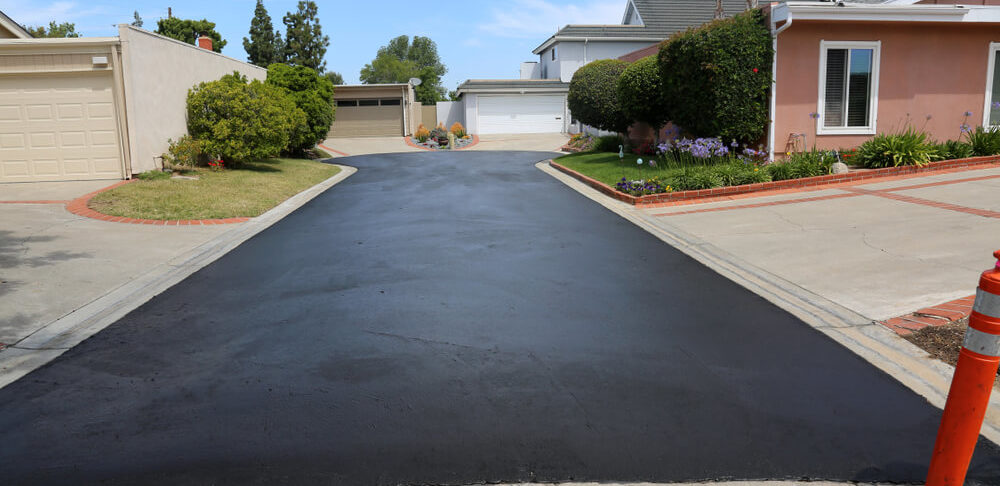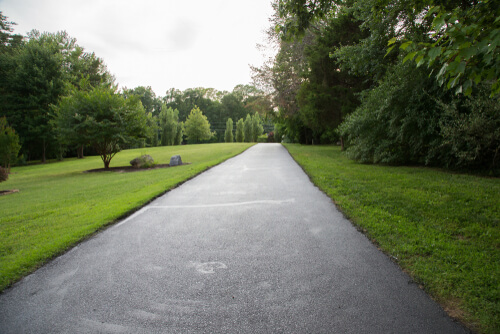A freshly laid asphalt driveway is a thing of beauty. It provides a safer parking space for your family, adds curb appeal to your home, and creates a clear path to the front door. But, laying asphalt is a long-term investment, making it crucial to protect. By learning to care for your asphalt driveway, you can keep it looking new for years to come.
How Long Should You Stay Off of a New Asphalt Driveway?
Any immediate use of your new asphalt driveway can quickly lead to early damage like depressions, marks, and holes. That being said, it’s best to stay off your driveway right after it’s finished to ensure its long-term care. But, how long do you need to wait before you can use your driveway?
Foot Traffic
The smartest move to care for your asphalt driveway is to avoid foot traffic for at least 72 hours. However, doing so isn’t always possible if your driveway is the only pathway to your front door. If that’s the case, you can still protect the asphalt by avoiding walking on it for 24 hours.
Vehicles
You shouldn’t drive on a new asphalt driveway for at least 72 hours. Vehicles weigh far more than people, so driving onto it too early could lead to significant damage or holes that disrupt the smooth finish.
While driving may be okay after 72 hours, you should take care not to park and leave any vehicles sitting on the asphalt for 14 days after the pavement has been laid. Doing so adds unnecessary weight to the fresh material and can lead to deep depressions and scarring.
Other Objects
If you intend to use your asphalt driveway to park objects other than cars, you should consider how they might impact care and maintenance. Items like patio furniture, bicycles, motorcycles, storage containers, and gazebos can cause depressions and damage to new asphalt.
Wait 72 hours before setting up your grill and fire pit. These items may be smaller than a car, but they can still pierce fresh asphalt and leave unsightly holes.
Weather Considerations
Another aspect of drive care is to account for the weather as the season you install your driveway can impact how long you need to wait to use it. Spring and fall allow the hot asphalt to cool and harden at a normal rate, letting you use your driveway within the recommended 72 hours or 14 days.
However, if you redid your asphalt driveway during the summer, the hotter weather may delay the cooling process. Since the asphalt gets laid while hot, it may not cool and harder as quickly as it would during cooler months.
If you completed your project in the summer, it doesn’t hurt to protect your drive by giving it extra time to cool down. Even for as long as the first 100 days of your driveway’s life, you should avoid parking on it on the hottest days for maximum care.
As badly as you want to use it, you’ll be glad you kept it in pristine condition with the right approach to care.
Asphalt Driveway Maintenance Tips
After your asphalt driveway has been laid and cooled, you can start using it. Keep in mind that frequent use will lead to normal wear and tear, but there are things you can do to care for it over time and make it last longer.
Maintain Cleanliness
Your drive lives in the great outdoors, so it will see plenty of debris during its 15 to 20-year lifespan. Objects like branches, leaves, trash, dirt, and more will park themselves on the asphalt as the days go on.
You can help protect your asphalt driveway and keep it looking fresh by sweeping it off regularly. Good care will also require removing large debris and trash that lands on it. The buildup of debris can lead to damage over time, including water pooling, depressions, and holes.
Repair Cracks
Though it’s hard to imagine now, there will come a day when you spot that first crack on your once-perfect asphalt driveway. It’s tempting to ignore it, especially if it’s a tiny crack, but it’s critical to repair that damage right away as part of the driveway’s long-term care.
Tiny cracks can quickly become much larger. Water might seep into the smallest damaged spots, which can ruin the foundation and make it rough to park. Frozen water can also expand cracks and make them larger.
Avoid Oil and Other Fluids
Asphalt is created using a chemical bond. When other fluids come into contact with even hardened asphalt, they can weaken this bond and leave your driveway susceptible to damage.
Avoid spilling oil and other vehicle fluids on your asphalt driveway. If you do have an accidental spill, be sure to clean it up thoroughly and right away. Use only cleaners deemed safe for asphalt surface care.
Don’t Use the Edges
The weakest part of your asphalt driveway will be the edges. Although some driveways include special edging to help protect them, most lack the necessary support to allow them to withstand the heavy weight of cars and trucks.
Do not drive or park on the very edge of your asphalt driveway. Doing so can cause the edges to crack and crumble over time. If you can, try to build up the soil along the edges to provide additional support as part of its overall care.
Keep Your Driveway Beautiful and Functional for Longer

A brand-new asphalt driveway is every homeowner’s dream. It’s certainly a long-term investment that you’ll appreciate for years to come. By using these care tips we’ve given you, your driveway will stay in great condition.
Whether you’re considering a new driveway or need repairs and care advice, we can help. Contact Richfield Blacktop today to learn more about asphalt driveways and our related services.






